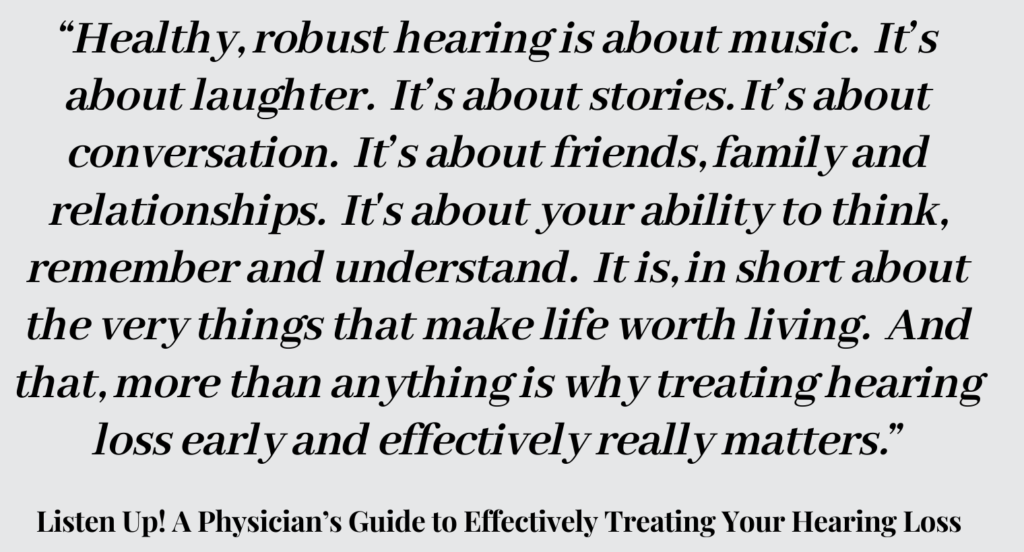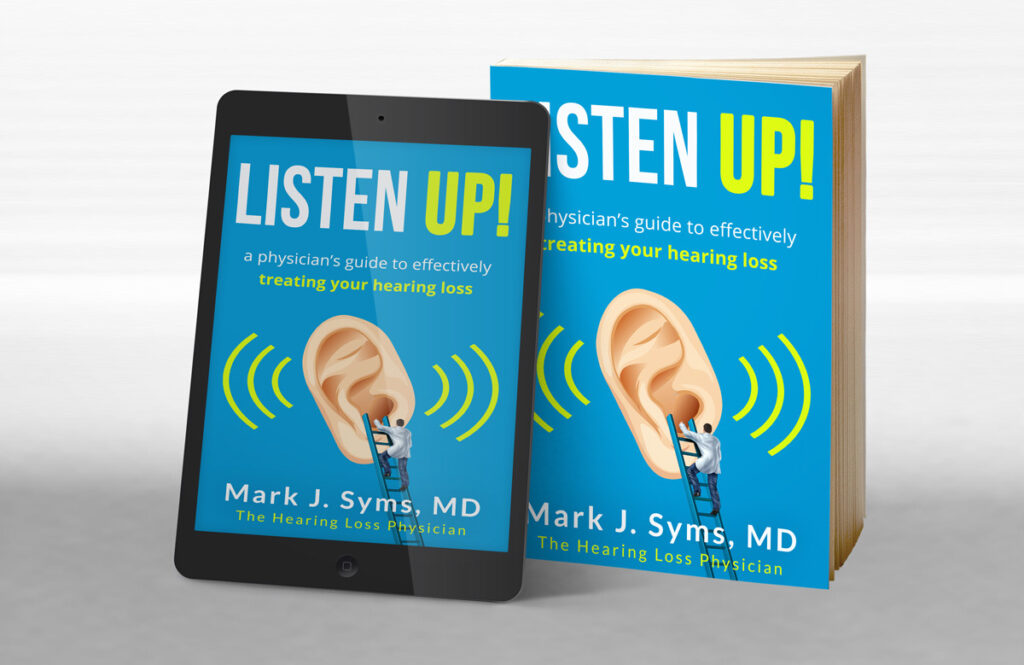
Dear Reader,
Thank you for taking the time to learn more about hearing loss. You are one step closer to effectively treating your hearing loss and improving your quality of life!
As a hearing loss physician with more than thirty years experience treating tens of thousands of patients, I know firsthand that better hearing means a better life. I also know how time consuming, frustrating and overwhelming it can be to find the right way to treat your hearing loss. Many patients lose hope after seeking treatment, only to find their hearing is no better off and in some instances, worse.
In this book, I show you the right way to go about effectively treating your hearing loss so you can end the struggle. Too often, patients get a “quick fix” that over-promises and under-delivers. More than one in four patients with hearing aids, for example, don’t use them. Here, I show you why that is and how we can do better.
You will discover exactly which questions to ask your providers so you can make an informed decision about choosing the right treatment option for you. My goal is for you to solve your hearing loss once and for all so you can remain independent, enjoy socializing, and connect better with family and friends — that is the fulfilling life you deserve.
So Listen Up! and let’s get started on your road to better hearing and a better life!



Excerpt: Chapter 4
Hearing Loss Impacts Everyone
~
Deal with It
Cindy is extremely close to her daughters. She’s devoted to their happiness and wants nothing but the best for them. A single mom, she even recently moved to a different state to be close to them and her grandchildren. Cindy spends her time and talents renovating and decorating her daughters’ homes and shuttling her grandchildren to their various activities.Positive and outgoing, her beautiful smile lights up the room at any gathering. But she also suffers from progressive hearing loss. Cindy knows it, and others notice that she becomes quiet in large social gatherings. Like many things in her life, though, she sees her hearing loss as her burden to bear alone. Cindy thinks it only impacts her, so she doesn’t feel the need for a hearing test. She’d rather just cope, as she has with so many other challenges, because she thinks she’s doing just fine without hearing aids.
Her well-intentioned and self-sacrificing course of action fails to recognize how hearing loss impacts those around her. Cindy often asks her daughters multiple times to repeat directions to the grandchildren’s school. Often when Cindy offers to do the grocery shopping, she misses a few things the kids asked her to pick up. Though her daughters are inconvenienced by these lapses, they’re more concerned about Cindy’s well being. They want her to enjoy a full and beautiful life that matches her beautiful smile.
What We Get Wrong About Hearing Loss
There are many myths and misconceptions about hearing loss. Often, they’re perpetuated by those who experience hearing loss as well as by those living with them.
“It Only Affects Me”
The most common myth I hear from my patients is that their hearing loss only affects them. Trying to put an end to any conversation about treatment, they’ll say, “I’m doing just fine.” (Based on my conversations with general physicians,I’d say they hear that excuse even more than I do. When you’ve already been referred to an ear specialist like me, after all, it’s harder to feign ignorance.) The patient places the burden of hearing loss squarely on their own shoulders, assuming that leaves them free to solve the problem as they see fit. “If hearing loss only hurts me,” the reasoning goes,“then it’s up to me to decide if and when I want to treat it.” The problem here? This just isn’t true. It might be your hearing that’s failing, but your hearing loss affects everyone around you. For example, it’s common for people with minor to moderate hearing loss to rely on their spouse to interact with the rest of the world. Suppose, then, that I have hearing loss. If my wife needs to order meals at a restaurant for me, that’s a qualitative change in her life. She doesn’t have hearing loss, but she is absolutely affected by mine. Getting treated for hearing loss, then, is also about everyone who cares for and interacts with me as well.
Another myth I hear from my patients is similar to this: “My hearing is better than so-and-so’s. They don’t have hearing aids, so I’m fine.” As with the last myth, this simply isn’t true, and it’s definitely not helpful. True, the effects of hearing loss are social, but the condition isn’t measured by how well those around you can hear. The only meaningful way to measure it is by comparing what you can hear to what you should be able to hear. As mentioned before, there are ways to scientifically detect hearing loss well before communication problems arise. A patient simply is not the best judge of their own hearing ability.
“Hearing Loss Isn’t A Health Condition”
The final myth is one I touched on earlier, and it’s a dangerous one: Hearing loss is not a health condition. An earlier chapter has ample evidence disproving this argument. Hearing loss can negatively impact your mental and physical health. The idea that it’s only a problem with one of your five senses needs to be thrown in the trash.
